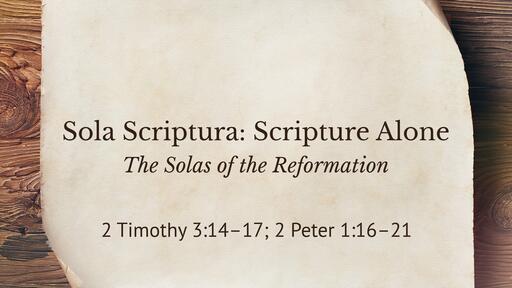Sola Scriptura: Scripture Alone

The man put in charge of the sale of indulgences in Germany was the Dominican John Tetzel, an unscrupulous man who was willing to make scandalous claims about his wares as long as such claims would help sales. Thus, for instance, Tetzel and his preachers were heard announcing that the indulgences that they sold made the sinner “cleaner than when coming out of baptism,” and “cleaner than Adam before the Fall,” and that “the cross of the seller of indulgences has as much power as the cross of Christ.” Those who wished to buy an indulgence for a loved one who was deceased were promised that, “as soon as the coin in the coffer rings, the soul from purgatory springs.”
Scripture is God-breathed.
The term theopneustos is built from the words theos (“God” or”god”) and pneō (“to blow,” “to breathe out”) and is not a common word in Greek literature.
Theopneustos was first used regarding wisdom in general and then later in reference to dreams. The sense was that the gods inspired wisdom and dreams for people to provide them with guidance or insight. Within the NT, theopneustos occurs only in 2 Tim 3:16a (“All Scripture is breathed out by God and profitable for …”; ESV). When Paul applies theopneustos to Scripture (graphē), he is introducing an unusual category for texts, which were not usually thought of as having religious authority in the Hellenistic world.
Scripture is the word of God
It does not merely contain the word of God, it is the word of God.
Every word in the Bible is Scripture.
Peter argues that both the Old Testament and the writings of the Apostles are Scripture:
Peter argues that the Pauline Epistles are Scripture:
Paul cites Luke’s Gospel as Scripture:
Similarly, in 1 Timothy 5:18, Paul quotes Jesus’ words as found in Luke 10:7 and calls them “scripture.
Revelation gives a warning that it should be treated solemnly as Scripture.
The Bible carries the authority of God.
all the words in Scripture are God’s words. Consequently, to disbelieve or disobey any word of Scripture is to disbelieve or disobey God himself.
Throughout the history of the church the greatest preachers have been those who have recognized that they have no authority in themselves and have seen their task as being to explain the words of Scripture and apply them clearly to the lives of their hearers. Their preaching has drawn its power not from the proclamation of their own Christian experiences or the experiences of others, nor from their own opinions, creative ideas, or rhetorical skills, but from God’s powerful words.
